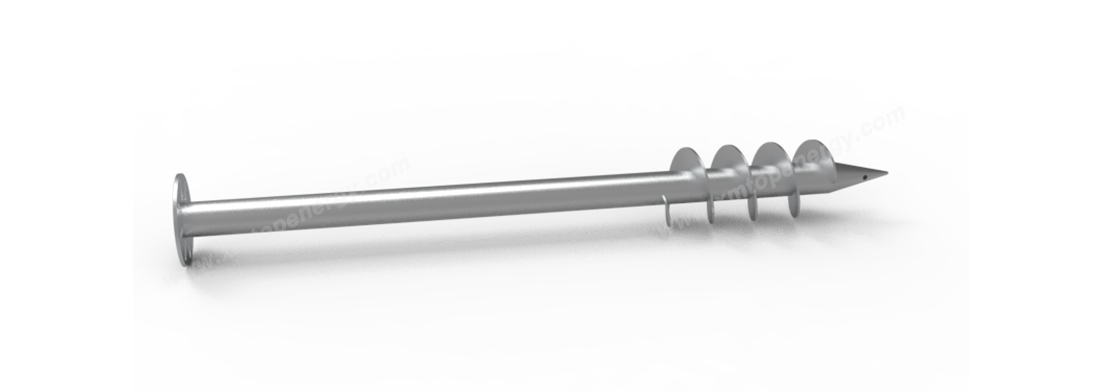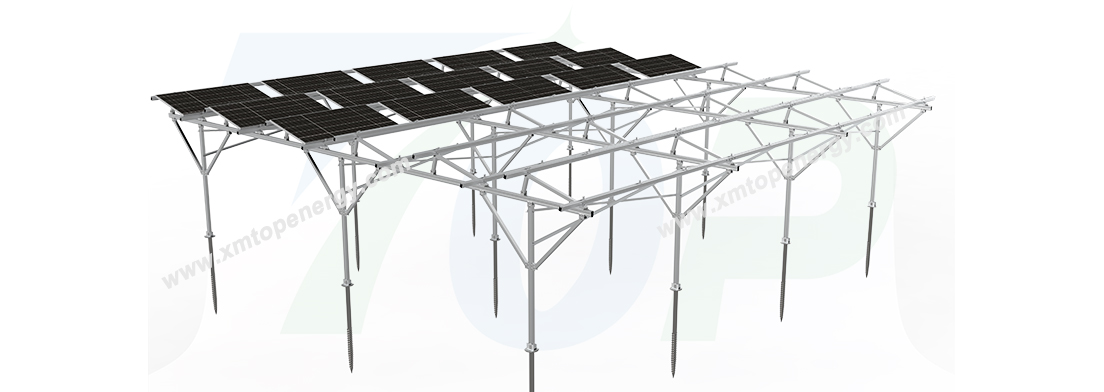When installing solar panel systems, fences, decking, or other structures, the foundation plays a critical role in ensuring stability, durability, and efficiency. Traditionally, concrete foundations have been the go-to solution, but with advancements in construction technology, ground screws have emerged as a modern alternative.
Both options have their own advantages and limitations, and choosing between ground screws vs. concrete foundations depends on factors such as installation time, cost, environmental impact, and soil conditions.
In this article, we will compare ground screws and concrete foundations, analyzing their strengths, weaknesses, and ideal applications to help you determine the best solution for your project.

Ground screws (also known as helical piles or screw piles) are steel anchoring foundations that are drilled or screwed into the ground to provide support and stability for various structures.
Quick and Easy Installation – No need for excavation or curing time.
No Concrete Required – Reduces material costs and carbon footprint.
Works on Uneven Terrain – Suitable for sloped or challenging soil conditions.
Reusable and Removable – Can be easily adjusted, removed, or relocated.
Minimal Environmental Impact – Less soil disturbance compared to traditional foundations.
Concrete foundations are traditional load-bearing structures made by pouring concrete into an excavated hole or trench and allowing it to cure. They provide long-lasting, stable support for buildings, solar panel systems, and other heavy structures.
High Load Capacity – Ideal for large-scale projects and heavy loads.
Extremely Durable – Can last for decades with minimal maintenance.
Widely Used & Proven – A long-established method for various applications.
Effective in Certain Soil Conditions – Works well in dense, compact soils.
|
Factor |
Ground Screws |
Concrete Foundations |
|
Installation Time |
Faster installation, no curing time required |
Requires excavation and curing (several days) |
|
Environmental Impact |
Minimal disturbance, reusable |
High carbon footprint due to concrete production |
|
Cost Efficiency |
Lower labor costs, fewer materials |
Higher costs for materials and labor |
|
Soil Conditions |
Works on uneven, weak, or rocky ground |
Best for compact, stable soil |
|
Flexibility & Adjustability |
Can be removed or relocated |
Permanent, difficult to modify |
|
Weather Dependence |
Can be installed in most weather conditions |
Requires dry conditions for curing |
|
Structural Strength |
Strong and durable for most applications |
Best for heavy loads and large-scale structures |
1. Faster Installation – Ground screws take just minutes to install, while concrete needs excavation, formwork, and curing time.
2. Reduced Labor & Machinery – Requires fewer workers and no heavy excavation equipment, reducing labor costs.
3. Eco-Friendly Solution – No cement, which reduces CO₂ emissions associated with concrete production.
4. Works on Sloped or Soft Ground – Ground screws can be installed on inclines and in weaker soils without extensive preparation.
5. Easily Removable & Reusable – Unlike concrete, which is permanent, ground screws can be removed or reused for future projects.

Ground screws are ideal for:
Solar Panel Mounting Systems (especially in rural, remote, or uneven terrain)
Small to Medium Construction Projects (e.g., wooden decks, fences, and carports)
Temporary or Semi-Permanent Installations (e.g., event structures, modular buildings)
Environmentally Conscious Projects (where low-impact installation is preferred)
Challenging Ground Conditions (such as rocky, sandy, or unstable soil)
Concrete foundations are best suited for:
Large-Scale, Heavy Load Structures (e.g., commercial buildings, industrial solar farms)
Stable, Compact Soil Areas (where excavation is feasible)
Permanent Installations (e.g., houses, commercial buildings)
Projects Requiring High Load-Bearing Capacity
Both ground screws and concrete foundations have their own advantages depending on the project requirements, budget, and site conditions.
· For fast, cost-effective, and eco-friendly installations, ground screws are the better choice.
· For permanent, high-load structures, concrete foundations remain the preferred solution.
Ultimately, the best choice depends on your project’s needs. If you are looking for a flexible, reusable, and sustainable option, ground screws are an excellent modern alternative to traditional concrete foundations.
Whether you're planning a solar panel system, fence, or decking project, considering both options carefully will ensure you choose the most effective and efficient foundation for your application.

 Xiamen TopFence Co.,Ltd.
Xiamen TopFence Co.,Ltd. No. 77, LingXia South Road, Huli District, Xiamen City, Fujian, China
No. 77, LingXia South Road, Huli District, Xiamen City, Fujian, China Tel: +8613365923720
Tel: +8613365923720
 Email: info@xmtopfence.com
Email: info@xmtopfence.com
 IPv6 network supported Sitemap
| XML
| Blog
| Privacy Policy
IPv6 network supported Sitemap
| XML
| Blog
| Privacy Policy


